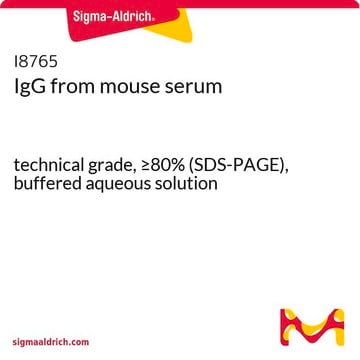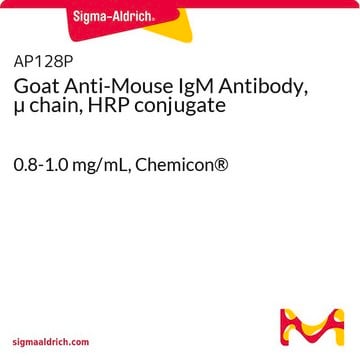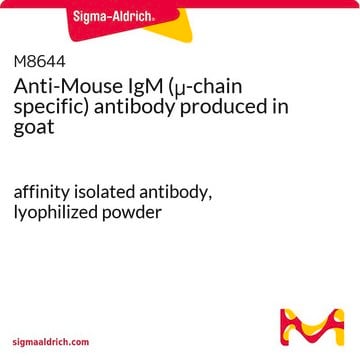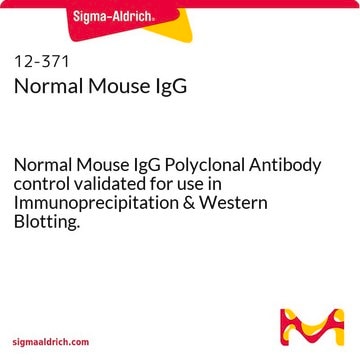PP50
IgM, Mouse
Mouse IgM Polyclonal Antibody control validated for use in ELISA.
Sign Into View Organizational & Contract Pricing
All Photos(1)
About This Item
UNSPSC Code:
12352203
eCl@ss:
32160702
NACRES:
NA.41
Recommended Products
biological source
mouse
Quality Level
clone
polyclonal
manufacturer/tradename
Chemicon®
concentration
2.0 mg/mL
technique(s)
ELISA: suitable
shipped in
wet ice
target post-translational modification
unmodified
General description
Source: Normal mouse serum.
Application
Research Category
Inflammation & Immunology
Inflammation & Immunology
Research Sub Category
Immunoglobulins & Immunology
Immunoglobulins & Immunology
Suitable for use as an antigen/ligand in immunochemical reactions, as a control in assays, in conjugation and other immunological methods requiring highly purified immunogloblins.
Quality
Single precipititin arc was observed against anti-mouse whole sera and anti-mouse IgM (μ chain specific) when assayed by IEP. No reaction was observed against anti-mouse IgG (Fc). Some light chain cross-reactivity may occur with anti-mouse IgG (H&L).
Physical form
Format: Purified
Purified immunoglobulin. Liquid (sterile filtered), in 0.1M Tris Chloride, 0.5M NaCl pH 8.0 with 0.1% sodium azide.
Storage and Stability
Maintain at +2-8°C before opening. The product is stable at +2-8°C as an undiluted liquid for up to 12 months after date of receipt before opening. For extended storage mix with an equal volume of glycerol (ACS grade or better), aliquot contents and freeze at -20°C or below for up to 6 months. Avoid repeated freeze/thaw cycles.
Legal Information
CHEMICON is a registered trademark of Merck KGaA, Darmstadt, Germany
Disclaimer
Unless otherwise stated in our catalog or other company documentation accompanying the product(s), our products are intended for research use only and are not to be used for any other purpose, which includes but is not limited to, unauthorized commercial uses, in vitro diagnostic uses, ex vivo or in vivo therapeutic uses or any type of consumption or application to humans or animals.
Storage Class Code
12 - Non Combustible Liquids
WGK
WGK 1
Flash Point(F)
Not applicable
Flash Point(C)
Not applicable
Certificates of Analysis (COA)
Search for Certificates of Analysis (COA) by entering the products Lot/Batch Number. Lot and Batch Numbers can be found on a product’s label following the words ‘Lot’ or ‘Batch’.
Already Own This Product?
Find documentation for the products that you have recently purchased in the Document Library.
Customers Also Viewed
Cardiac dysfunction induced by experimental myocardial infarction impairs the host defense response to bacterial infection in mice because of reduced phagocytosis of Kupffer cells.
Nogami Y, Kinoshita M, Takase B, Inatsu A, Ishihara M, Seki S, Maehara T
The Journal of Thoracic and Cardiovascular Surgery null
Manabu Kinoshita et al.
Infection and immunity, 79(7), 2670-2680 (2011-05-04)
Methicillin-resistant Staphylococcus aureus (MRSA) infection is a grave concern in burn-injured patients. We investigated the efficacy of interleukin-18 (IL-18) treatment in postburn MRSA infection. Alternate-day injections of IL-18 into burn-injured C57BL/6 mice significantly increased their survival after MRSA infection and
Xianli Wang et al.
Bioscience reports, 31(2), 87-98 (2010-05-11)
HF (heart failure) after MI (myocardial infarction) is a major cause of morbidity and mortality worldwide. Recent studies have shown that hydrogen sulfide (H2S) has cardioprotective effects. Hence, we aimed to elucidate the potential effects of H2S on HF after
Irati Garmendia et al.
Cancer immunology research, 11(4), 530-545 (2023-03-09)
One billion people worldwide get flu every year, including patients with non-small cell lung cancer (NSCLC). However, the impact of acute influenza A virus (IAV) infection on the composition of the tumor microenvironment (TME) and the clinical outcome of patients
Restoration of natural IgM production from liver B cells by exogenous IL-18 improves the survival of burn-injured mice infected with Pseudomonas aeruginosa.
Manabu Kinoshita, Nariyoshi Shinomiya, Satoshi Ono, Hironori Tsujimoto et al.
Journal of immunology (Baltimore, Md. : 1950) (1950)
Our team of scientists has experience in all areas of research including Life Science, Material Science, Chemical Synthesis, Chromatography, Analytical and many others.
Contact Technical Service






